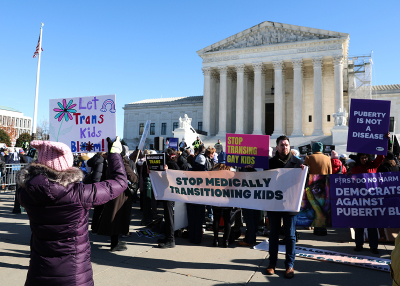US v. Skrmetti: Supreme Court trans case may affect another 25 states

The U.S. Supreme Court on Dec. 4, heard oral arguments in a court case that signals the transgender issue will continue to roil American culture, law and politics for the foreseeable future.
U.S. v. Skrmetti is the first Supreme Court case to bring to the fore how the Constitution should impact gender identity issues.
As explained by Jonathan Skrmetti, Tennessee’s Attorney General, in The Tennessean, the question before the Court “is whether Tennessee can protect kids from procedures that its legislature deems harmful."
Strictly speaking, U.S. v. Skrmetti is about whether the state of Tennessee can protect minors from undergoing gender-altering procedures and treatments that the state of Tennessee considers harmful and counterproductive. In 2023 the Tennessee state legislature passed Senate Bill 1(SB1) that restricted drugs or surgeries for the purpose of facilitating gender transition to be administered to adults only (18 and older).
In other words, hormone treatments, puberty blockers, and sex reassignment surgeries are beyond the pale for minors in Tennessee. Strictly speaking, U.S. v. Skrmetti is about protecting children and adolescents, not discriminating against adult members of the transgender community.
In making this distinction, Tennessee is standing squarely within a long-term American legal tradition that recognizes the crucial differences between minors and adults. Paramount among these differences, writes David French in The New York Times, is that minors are recognized as
“incapable of granting informed consent to medical procedures. They’re too young to understand the risks and rewards, and too susceptible to adult influence to be independent thinkers.”
Usually, parents make such decisions for their children. However, when the treatment is controversial, as in the present case, the state has reserved the right to decide which treatments are available to minors. Additionally, there is a longstanding legal precedent that parents do not have carte blanche in deciding if a treatment can be withheld from their children.
For example, if parents do not believe in blood transfusions as a matter of religious conviction, they are free to decline such transfusions for themselves, but they cannot deny them to their children if the transfusions are considered medically necessary. The state can interpose itself between parent and child and order a blood transfusion, arguing that the minor is incapable of understanding adequately the medical consequences of his or her decision.
While the Supreme Court was hearing arguments in U.S. v. Skrmetti, the United Kingdom further strengthened its virtual ban on “puberty-blocking drugs as a treatment for minors with gender dysphoria…due to an ‘unacceptable safety risk,’” the National Review reports.
The U.K. had issued a temporary ban in May after the publication of the Cass Review by the National Health Service. During oral arguments in U.S. v. Skrmetti, Justice Samuel Alito referenced the Cass Review when questioning U.S. Solicitor General Elizabeth Prelogar:
“After the filing of your petition, of course, we saw the release of the Cass Report in the United Kingdom, which found a complete lack of high quality evidence showing that the benefits of the treatments in question here outweigh the risks.…And so I wonder if you…think it would now be appropriate to…withdraw the statement that there is overwhelming evidence establishing that these treatments have benefits that greatly outweigh the risks and the dangers.”
The Supreme Court will not reach a decision in U.S. v. Skrmetti until the late spring or early summer of next year. When they do so, they will either decide to uphold Tennessee’s law or not, and also whether it just applies to Tennessee or to the other approximately 25 states that have enacted similar laws. (Approximately nine states have enacted laws similar to the one enacted in Minnesota that would potentially remove custody from parents who did not agree to these kinds of gender-altering treatments for their children).
U.S. v. Skrmetti is a legal harbinger that the transgender issue has moved to the forefront of cultural, political, and legal debate in American society where it will remain for the foreseeable future. We must always remember that politics is downstream from culture and culture is downstream from religion.
For those tens of millions of Americans who reflect a traditional Christian worldview (Catholic, Orthodox, and Protestant), the transgender issue will have enormous religious liberty and freedom of conscience implications. Will America follow the Tennessee model or the Minnesota model? Are parental rights to be sacrificed on the altar of a minor child’s “right” to access transgender treatments?
The consequences of such political and judicial decisions are immense.
All concerned Americans of traditional religious faith should be praying fervently that our Heavenly Father will protect our nation from going down this transgender path that is fraught with such peril and heartbreak. May God give our Supreme Court sufficient wisdom to decide U.S. v. Skrmetti and similar cases correctly.
Dr. Richard Land, BA (Princeton, magna cum laude); D.Phil. (Oxford); Th.M (New Orleans Seminary). Dr. Land served as President of Southern Evangelical Seminary from July 2013 until July 2021. Upon his retirement, he was honored as President Emeritus and he continues to serve as an Adjunct Professor of Theology & Ethics. Dr. Land previously served as President of the Southern Baptist Convention's Ethics & Religious Liberty Commission (1988-2013) where he was also honored as President Emeritus upon his retirement. Dr. Land has also served as an Executive Editor and columnist for The Christian Post since 2011.
Dr. Land explores many timely and critical topics in his daily radio feature, “Bringing Every Thought Captive,” and in his weekly column for CP.



























